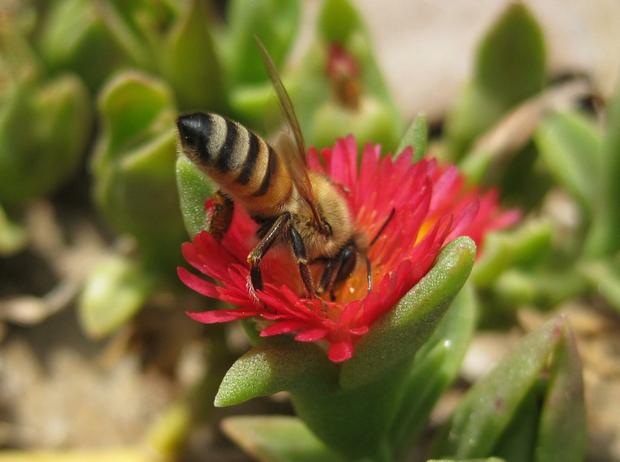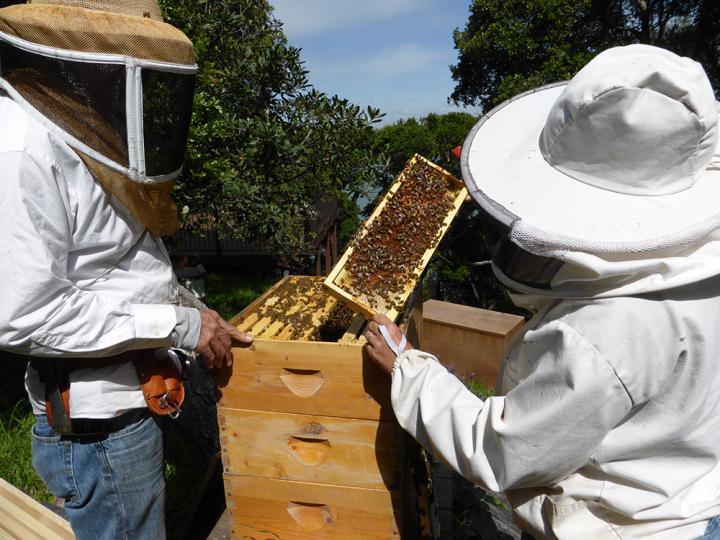Natural pollen makes honey bees significantly more resistant to pesticides than an artificial diet and pesticide exposure causes changes in gene expression related to diet and nutrition, according to a new study.
Diet even impacts how long bees can survive when given lethal doses of a pesticide.
To make their determination, the scientists first fed one of two miticides -- coumaphos or fluvalinate, the two most abundant and frequently detected pesticides in the hive -- to bees for a period of seven days. On the seventh day, the researchers extracted RNA from the bees, attached a fluorescent marker to the RNA and examined differences in gene expression patterns -- indicated by changes in patterns of fluorescence -- between the pesticide-treated bees and the control bees.

Natural pollen makes honey bees significantly more resistant to pesticides than an artificial diet Credit: Daniel Schmehl, University of Florida.
"Honey bees are exposed to hundreds of pesticides, while they are foraging on flowers and also when beekeepers apply chemicals to control bee pests," said Christina Grozinger, professor of entomology and director of the Center for Pollinator Research, Penn State. "Our study demonstrates that exposure to non-lethal doses of at least two of these pesticides causes large changes in the expression of genes involved in detoxification, immunity and nutrition-sensing. This is consistent with results from previous studies that have found that pesticide exposure compromises bees' immune systems. Furthermore, our study reveals a strong link, at the molecular level, between nutrition, diet and pesticide exposure."
"This interaction between pesticide exposure and nutrition is likely what's at play in our finding that feeding bees a complex diet of pollen -- their natural diet -- makes them significantly more resistant to lethal doses of a pesticide than feeding them a more simple, artificial diet," said Daniel Schmehl,
entomologist at the University of Florida. "We found significant changes in 1,118 transcripts -- or pieces of RNA -- among the bees that were fed either of the two miticides compared to the control group. These transcripts included genes involved in detoxification, immunity and nutrition."
Based upon the results, the team performed several subsequent analyses aimed at understanding the impact of pesticides on honey bee physiology. One of these subsequent analyses examined the susceptibility of bees to pesticide stress after consuming a pollen diet or an artificial diet -- either a soy protein or no protein diet. The team fed the bees these diets while simultaneously feeding them a lethal dose of the pesticide chlorpyrifos, an insecticide that is frequently used to control pests in agricultural crops and commonly detected in honey bee hives. They then recorded bee mortality daily for each of the treatment groups for a period of 16 days.
The researchers found that the bees that were fed a pollen-based diet exhibited reduced sensitivity to chlorpyrifos compared to the bees that were fed an artificial diet.
The results appear in the online issue of the Journal of Insect Physiology.
"This is the first time such a strong link between pesticide exposure and diet has been demonstrated at the molecular level, and the first time the effects of artificial versus natural diets have been explored in terms of resistance to pesticides," said Grozinger. "Diet and nutrition can greatly impact the ability of bees to resist pesticides, and likely other stressors. However, agriculture and urbanization have reduced the amounts and diversity of flowering plants available to bees, which likely nutritionally stresses them and makes them more sensitive to these other stressors. If we can figure out which diets and which flowering plants are nutritionally optimal for honey bees, we can help bees help themselves."

Feeding honey bees a natural diet of pollen makes them significantly more resistant to pesticides than feeding them an artificial diet, according to a team of researchers Credit: Maryann Frazier, Penn State